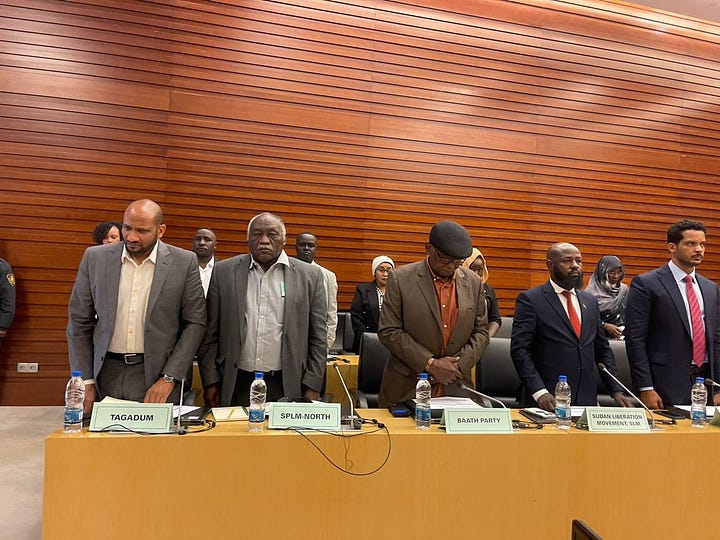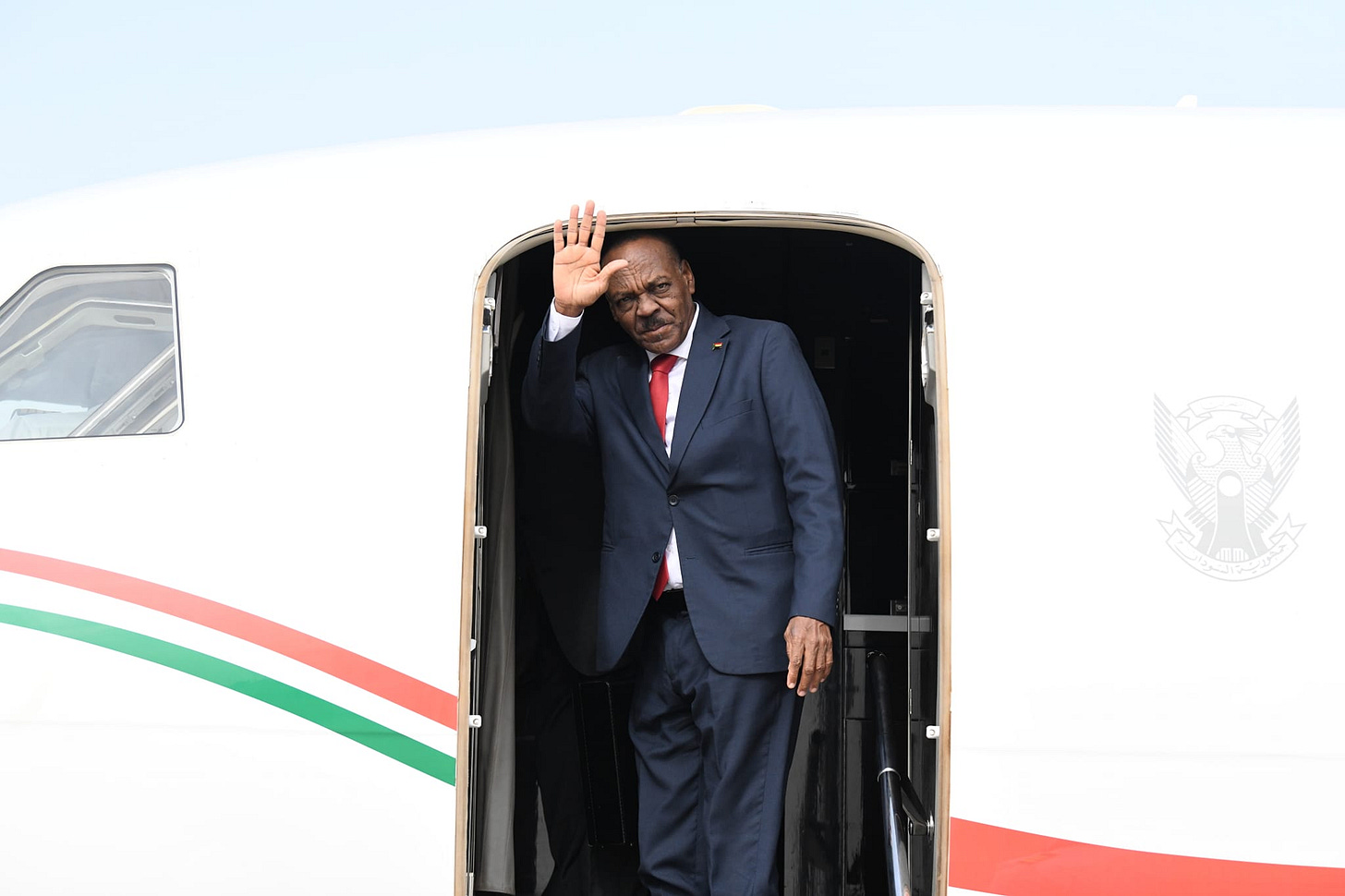Final preparations for Geneva talks
Pressure mounts on Sudan's military to join ceasefire talks
The U.S. State Department is finalizing preparations for ceasefire talks between Sudan’s warring parties in Geneva starting August 14, despite reports that preparatory consultations with Sudan’s military regime have faltered.
The latest ceasefire push has gained some traction both regionally and domestically within Sudan, but its outcome remains in doubt as pro-war hardliners on both sides attempt to sabotage the effort and prolong the war.
Sudan’s military junta led by Abdel Fattah al-Burhan (above right) has indicated openness to the talks but not finally confirmed its participation, while the rebel Rapid Support Forces (RSF) led by Mohamed Hamdan Dagalo (above left) declared their participation while continuing offensive military operations ahead of the talks.
U.S. Special Envoy Tom Perriello wrote on social media Sunday that he had arrived in Geneva ahead of the talks, saying he was “excited” to launch the peace effort:
“With thanks to Saudi Arabia and Switzerland as co-hosts, I’m excited to arrive in Geneva from Jeddah to launch this urgent international effort in Switzerland to end the crisis in Sudan. In addition to consultations with the parties, we have heard from tens of thousands of civilians inside and outside of Sudan. Their message is clear: they want an end to the daily terror of shelling, starvation, and sieges, and the United States and our partners stand committed to answering that call.”
This statement came after reports of consultations between the U.S. government and Sudan’s military regime held in Jeddah, Saudi Arabia. Sudanese and Saudi media had reported that the talks “failed” or “ended without a breakthrough.”

Sudan’s military government, which is based in Port Sudan after losing control of the capital Khartoum, sent only a low-level minister to the Jeddah consultations, Minister of Minerals Mohamed Bashir Abunommo, who is affiliated with the party of Minni Minawi, not with the more influential Islamists or the military.
Abunommo wrote on Facebook after concluding the talks Saturday, “As head of the government delegation in the consultative meetings with the Americans in the city of Jeddah, Saudi Arabia, I announce the end of the consultations without an agreement on the participation of the Sudanese delegation in the Geneva negotiations.”
He mentioned disagreements over several “details,” saying the government leadership would now have to decide whether to proceed to the Geneva talks or not.
[UPDATE: Sudan’s state-run news agency SUNA reported late Sunday that
The Port Sudan government is reluctant to participate in the Geneva talks without further guarantees and concessions as to their agenda, participants, and format. One demand is for its negotiators to be recognized as the “Government of Sudan” delegation, rather than just a “Sudan Armed Forces” delegation.
Al-Burhan’s government also wants to involve third parties in the talks, specifically the allied Darfur movements. By including proxies, the Sudanese military seeks to avoid the appearance that it is negotiating with the RSF as an equal. This demand is likely off the table, though by appointing Abunommo as negotiator (who is part of SLM-Minawi), the regime both distances itself from the Geneva process and indirectly forces the participation of the allied Darfur movements.
Saudi news channel Al-Arabiya reports that Perriello “proposed that the negotiating delegation from the government side be led by an officer or senior official in the army to make the round a success and accelerate it.”
This would satisfy the RSF demand to negotiate only with the military, not with the government, since it claims that there is no legitimate government in Sudan. The RSF spokesperson stated July 30, “The Rapid Support Forces will only negotiate with the Armed Forces and will not allow any other Sudanese institution [such as the foreign ministry] to be involved in the negotiations or talks to stop the war and ensure humanitarian access. It reaffirms its position that there is no government in Sudan today due to the October 25, 2021 coup and the subsequent constitutional breakdown caused by the April 15th war.”
In contrast to the Sudanese negotiator, the U.S. mediator struck a more upbeat tone about the consultations. Perriello wrote on the social media platform Twitter on August 10, “As the United States prepares for urgent Sudan ceasefire talks next week, we are holding final meetings in Jeddah hosted by the Saudi Government to wind up months of consultations with parties to the conflict, regional partners, technical experts and, most importantly, the tens of thousands of Sudanese people who have reached out, demanding an end to this war and famine.”
At this point, it’s unclear how the U.S. will proceed if the Port Sudan regime fails to send a delegation to Geneva. According to Al-Arabiya, “technical consultations between the international parties will begin on August 14 in Geneva, even if the army delegation does not participate.”
The U.S. has revealed little about the format of the upcoming Geneva negotiations. However, representatives of the Arab League, African Union, IGAD, European Union, and several Middle Eastern and African nations are expected to participate as observers and potentially will also hold consultations apart from the warring parties. This would give the talks a summit-like character.
Sudan’s absence from the Geneva negotiations therefore would be conspicuous and would trigger domestic and international criticism. It is possible that Al-Burhan will send a delegation but not necessarily a high-level one with a remit to strike a deal.
Meanwhile, the African Union on Saturday hosted consultations at its headquarters with Sudanese opposition parties and civil society groups, including representatives of Taqadum (an anti-war coalition), SPLM-North (a non-aligned armed group that controls significant territory), the Democratic Unionist Party, Ba’ath Party, and the Popular Congress Party, which was once led by the famous Islamist Hassan al-Turabi.
This was the second of two consultative meetings, the first of which involved pro-army political groups. In a statement, the African Union said that these consultations are meant to prepare for “the convening of an Inter-Sudanese Political Dialogue.” Such a dialogue potentially could take place after an initial ceasefire deal to discuss the potential shape of a political transition.
A high-level panel appointed by the AU, as well as a special envoy of the UN Secretary General, former Algerian foreign minister Ramtana Lamamra, are among those who are supporting the U.S. ceasefire effort, alongside the co-hosts of the upcoming Geneva talks, Saudi Arabia and Switzerland.




Now or never for ceasefire push?
Some observers have questioned whether this is a “now or never” moment for ceasefire talks between Sudan’s warring parties, due to the upcoming U.S. presidential election in November, which could result in a change of administration, upending the leadership within the U.S. State Department.
The U.S. is the only foreign nation that has offered to mediate talks recently, after a disastrous effort by East Africa’s IGAD heads of state in December and January, which resulted in Sudan withdrawing from the IGAD bloc and suspending all peace talks. Saudi Arabia is no longer a co-mediator of the talks, as it was last year, instead accepting a lesser role as “co-host.” Regional powers Egypt and Ethiopia have hosted recent peace consultations but without applying serious pressure for a ceasefire.
Wasil Ali, an observer of both U.S. and Sudanese politics and former deputy editor of Sudan Tribune, wrote on the Twitter platform,
“God knows whether the army will eventually negotiate or not, but let us remember that the U.S. elections are around the corner, there is a new president coming, and Saudi Arabia has basically lost its enthusiasm since the last round of negotiations at the end of 2023 regarding the story of mediating the war in Sudan. Accordingly, there is a not insignificant possibility that if the negotiations do not happen now, they will be postponed until mid-2025.”
The U.S. Special Envoy for Sudan, Tom Perriello, is a former U.S. Congressman affiliated with the Democratic Party who also served as Barack Obama’s special envoy to Africa’s Great Lakes region and as a special representative appointed to carry out a quadrennial review of the U.S. diplomatic service.
Perriello’s standing within the U.S. government therefore depends partly on the outcome of the U.S. presidential election in November. If the U.S. presidential candidate Kamala Harris wins in November, he likely would remain in his position, but if the candidate Donald Trump wins then Perriello might be pushed out or opt to leave.
Unlike previous U.S. envoys to Sudan, Perriello is an envoy within the State Department reporting to the Secretary of State, not a presidential envoy. At this stage, it is not certain whether he would continue serving as special envoy for Sudan if Trump wins the election. The latest opinion polling shows that the two U.S. presidential candidates are in a close race with Kamala Harris leading slightly.
If Perriello were to step down, the ceasefire push would be left to career diplomats, or would be suspended until leadership changes were completed in Washington.
Egypt-Sudan meeting
Meanwhile, in another political development, Egypt’s Foreign Minister Badr Abdelatty met with Sudan’s military ruler Abdel Fattah al-Burhan in the Rwandan capital Kigali on Sunday, during a visit for the inauguration of Rwanda’s President Paul Kigame.
Egypt’s state media and foreign ministry characterized the meeting as friendly and emphasized Egypt’s “continued support for Sudanese national institutions, unity, and territorial integrity, stressing non-interference in its internal affairs.”
Throughout the conflict, Egypt has aligned itself more with Al-Burhan’s government than the RSF, but hasn’t offered much practical or political support. Recently, it has adopted an increasingly pro-peace stance rather than endorsing the Sudanese government’s declared aim of “crushing the rebellion.”
In February, Egypt struck a huge investment deal with the UAE, which Sudanese military leaders have declared to be a hostile power. During a summit last month, Egypt lent legitimacy to the Sudanese anti-war coalition Taqaddum.
Additionally, Egypt is intensifying contacts with Chad amid growing concern about progress by militant jihadist groups in the Sahel, particularly in Niger, Mali, and Burkina Faso. Egypt’s President Abdel Fattah El Sisi met Chad’s President Idriss Déby two weeks ago in El Alamein City. They discussed Sudan, Libya, and “terrorist threats” in the Sahel region, according to Egyptian presidential spokesman Ahmed Fahmy.
Regarding Sudan, Fahmy said, “The two leaders agreed on the necessity of supporting efforts to achieve a ceasefire.”
Déby’s government insists on its neutrality in the ongoing Sudanese civil war but tacitly has supported the RSF by allowing supplies and weapons to flow through Chadian territory into Darfur and by permitting the sale and transit of massive amounts of plunder, such as stolen cars, which were taken from Sudan by the RSF.
Perriello, who visited Cairo earlier this month for consultations with both the Arab League and Egyptian government, said that Egypt “has a deep interest in resolving this conflict for the well-being of Egyptians and Sudanese alike. We will continue to work closely with Egypt and Sudan to end this war.”
These diplomatic developments suggest that Egypt is increasingly on board with the regional and international consensus favoring a ceasefire and a negotiated settlement to the conflict, rather than a military solution.
This emerging consensus has left the Port Sudan government increasingly isolated from its Arab neighbors and scrambling to find wartime allies. Hardliners favor an alliance with Iran, with which Sudan recently fully restored relations.
Eritrea, another potential source of support, has sent mixed signals. It expelled the Sudanese ambassador last month, while simultaneously sending a naval delegation to Port Sudan delivering a message of strong support for Sudan’s military.
“We have arrived in this difficult circumstance to confirm that we are with Sudan’s just cause, and we always stand with the leaders of the army, navy, infantry and air force,” the head of the Eritrean delegation said, as quoted by Al-Sharq Al-Awsat.







